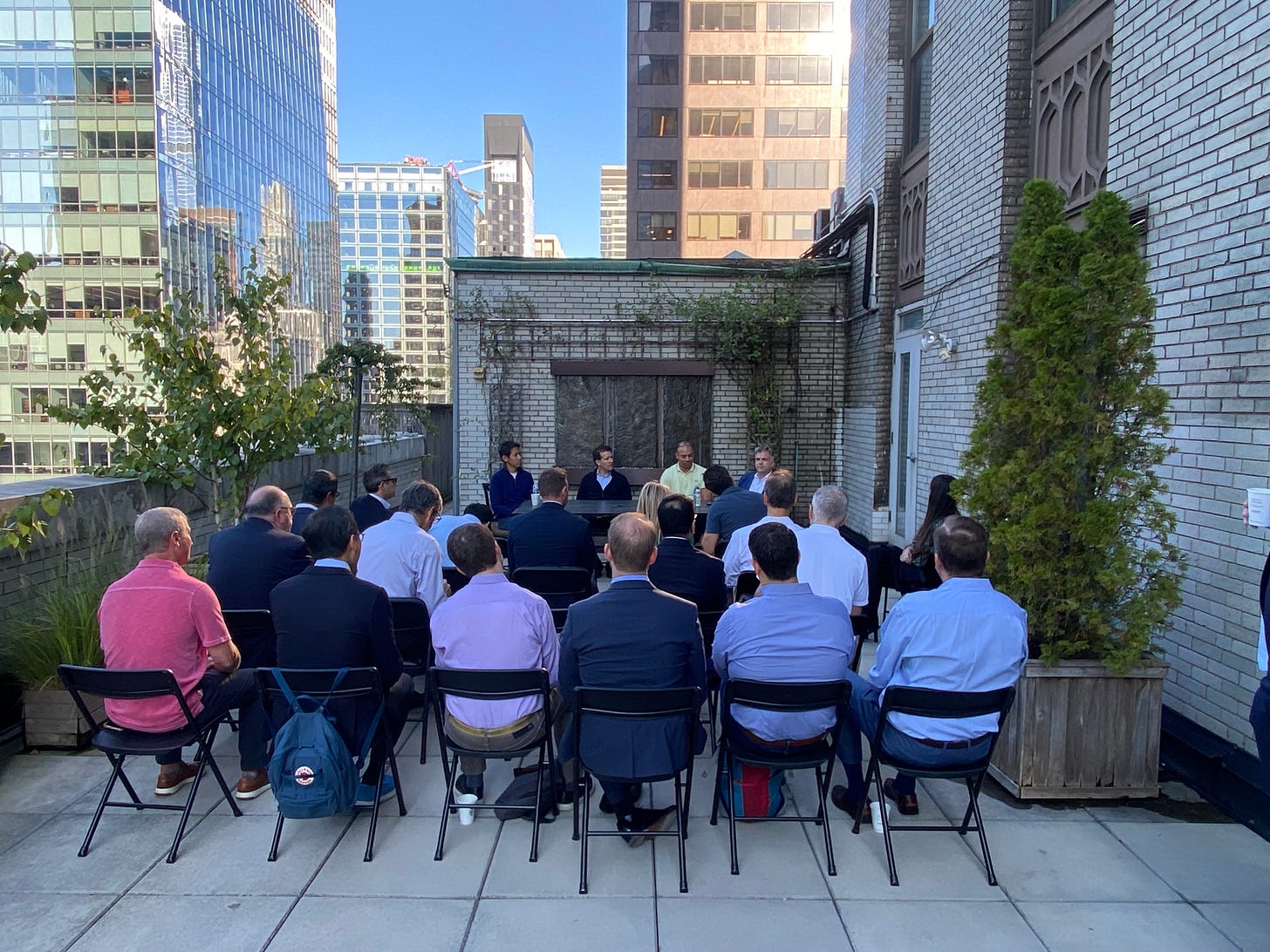A FEW THOUGHTS ON CRYPTO
ISSUE #80
Hi All,
Last week I was in New York and served as the moderator on a Crypto panel hosted by the Hilbert Group and James Alpha. Hat tip to Richard Murray, the CEO of the Hilbert Group, who shared his notes from the panel discussion, see below.
Hilbert co-hosted a crypto investor round-table discussion in New York last week. Below is a summary of the key points made.
The panelists represented 3 different approaches to blockchain / crypto investing:
Multi-strategy – Bitwise – Jeff Park
Liquid quant market neutral – Hilbert – Dr. Niclas Sandstrom
Venture capital - The Forest Road Company – Chris Solarz
As a CIO, the moderator, Sean Bill, was one of the earliest public pension adopters of crypto.
The audience consisted of 23 allocators and advisors with a combined AUM/AUA of more than $100bn.
Some of the insights, experiences and views shared:
Once-in-a-generation investment opportunity:
Blockchain and digital asset investments provide multiple “once-in-a-generation” structural opportunities, including:
An extreme concentration of technology innovation and associated value creation;
An immature market enabling many tradefi trading playbooks (some now stretched in tradefi assets) to be lifted into a new asset class offering high growth, high volatility, high inefficiencies and higher return potential.
Digital asset investment strategies need to compensate with a meaningful premium over tradefi investment strategies given the additional systemic risk involved.
Valuations of projects, cryptocurrencies and tokens are still difficult given rapid evolution of ecosystem and no common valuation basis yet.
For many institutional allocators the operational due diligence ODD, takes precedence over the trading strategies themselves. Secure, transparent and robust processes and service providers are key requirements – as a failure of these might lead to much larger losses and reputational damage than a mediocre trading strategy.
We are still early and the steps of institutional adoption (e.g. BlackRock on-boarding BTC through Coinbase) are getting bigger and more common. We have not seen those significant flow tail winds yet and that is likely 2023 development.
Some allocators have reassessed their definition of market neutral given several “market neutral” (e.g. 3AC) proved to exhibit levered directional exposure during the May/June 2022 crash.
Ethereum and staking:
The staking of ETH and the associated yield will potentially see ETH become the benchmark asset for “fixed income” crypto instruments and a yield curve will emerge.
Pros and cons of staking. The success of the Ethereum merge will likely encourage and accelerate the other planned upgrades for scalability and privacy – that is a good thing. It will reduce the power consumption with 99.9% which. for the Ethereum network, accounts for 0.2% reduction of global energy consumption. On the downside there is the risk that the biggest stakers, i.e. the large exchanges, will be able to exercise undue influence on the future development of Ethereum, making it less decentralized. Less decentralization could make it easier for regulators to pressure the exchanges into imposing measures that would stifle innovation.
Pure decentralization is seen as one of the biggest advantages of the blockchain technology – this was illustrated during the LUNA, Celsius, 3AC collapse where all entities that became insolvent where governed in a centralized manner with discretionary decisions on asset allocations, whereas pure DeFi protocols such as Uniswap, Aave and Compound worked flawlessly throughout the severe market turmoil.
We polled the audience:
100% have personal account exposure to crypto.
30% have had BTC exposure for more than 3 years.
60% have professional exposure to crypto in their portfolios.
Of those yet to professionally invest in crypto, 100% are learning and exploring opportunities.
70% more bullish long-term on ETH versus BTC.
Thanks again to Richard for sharing his notes!
VIDEOS | PODCAST:
CNBC ON SPAC UNWINDS: CNBC's David Faber and the 'Squawk on the Street' team discuss Social Capital CEO Chamath Palihapitiya's decision to unwind two SPACs due to high market valuations and market volatility.
HOW TO PREPARE FOR A RECESSION: Raoul Pal, CEO and co-founder of Real Vision, has some ideas that can certainly help average up how you think about getting through our current recession. Whether your money is all in crypto, in a 401k that’s reduced by half, or in none of the above, the ideas that Raoul shares in this episode may help you navigate through a very dificult economic enviroment.
I hope that you enjoy the letter as much as I enjoyed writing it and please feel free to share the links with friends and associates. If you are interested in startups and are an accredited investor you can join over 750 other backers that follow my AngelList syndicate here.
Stay safe and stay well. Sean Bill / MacroCrunch / Twitter
